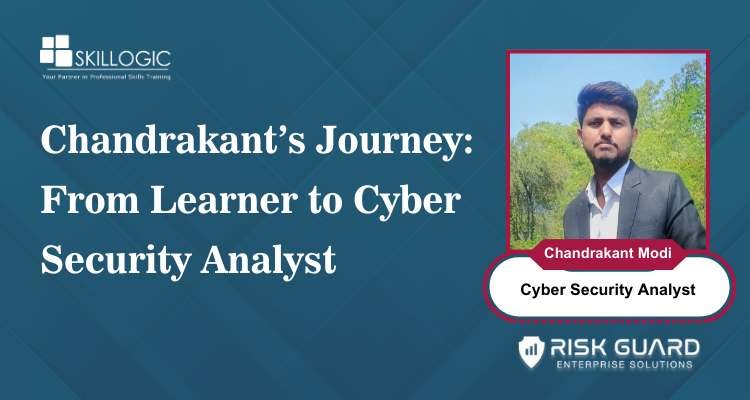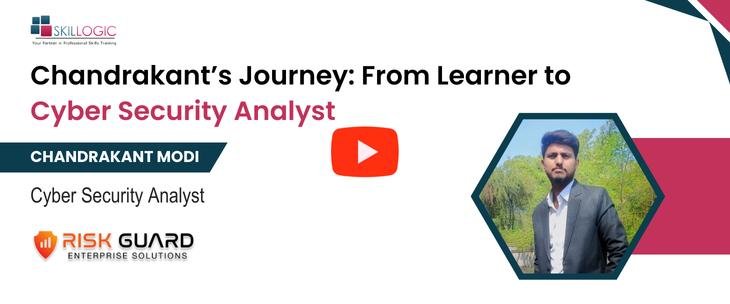Chandrakant’s Journey: From Learner to Cyber Security Analyst
Discover Chandrakant’s inspiring journey from Electronics graduate to Cyber Security Analyst at Risk Guard Enterprise Solutions. Learn how SKILLOGIC’s hands-on training, internship, and placement support helped him build a successful career in cyber security.

Chandrakant’s journey into cyber security is a remarkable example of determination, consistency, and smart career choices. Coming from an Electronics and Communication background, he first explored networking before realizing that cyber security is a future-proof domain where demand will only keep growing. What started as curiosity soon turned into a strong career goal when he decided to pursue specialized training.
With structured guidance, hands-on learning, and practical-focused training from SKILLOGIC, along with an internship that gave him exposure to real-time projects, Chandrakant steadily built his skills and industry knowledge. The mock interviews, placement support, and continuous mentorship not only strengthened his confidence but also helped him secure his first role as a Cyber Security Analyst at Risk Guard Enterprise Solutions.
Here, Chandrakant shares his learning experience, training journey, interview preparation, and valuable advice for aspirants who wish to build a career in cyber security, even if they come from a non-IT background.
Chandrakant’s Cyber Security Journey in His Own Words
In this section, Chandrakant shares his education background, training experience at SKILLOGIC, internship learnings, interview preparation, and advice for aspiring cyber security professionals.
Q1: Can you introduce yourself and share your background before cyber security?
My name is Chandrakant Modi. I completed my graduation in Electronics and Communication Engineering from Shat Institute of Technology in Kalaburagi. Before entering into cyber security, I pursued a networking course. During that time, I realized that cyber security is one domain that will always remain important because security is required in every field. I chose this industry because the demand for cybersecurity will continue to grow, and unlike some other fields, it is less likely to be completely replaced by AI in the future.
Q2: Why did you choose SKILLOGIC for cyber security training and how was your experience?
I found SKILLOGIC while searching online, and I felt it would be a good institute for my learning. The teaching staff was excellent, especially Akbar Sir, who took most of the sessions. The classes started with theoretical concepts in the first 10 to 15 days and then moved into hands-on training with tools. I also practiced extensively on platforms like TryHackMe to improve my skills. Since I joined offline classes, I could directly interact with trainers and clear doubts immediately. This made the overall learning experience smooth and effective.
Q3: How did you manage your daily study routine along with classes?
The classes were usually 2 hours long, and after that, I would dedicate about 4 to 5 hours daily to studying. I divided my time between revising theory and practicing tools. For example, after class I would spend around 2 hours on theory, and later in the evening after dinner, I would practice cyber security tools and practical exercises for another few hours. This consistent effort really helped me build confidence.
Q4: How was your internship experience after completing the course?
The internship was very useful because we got to work on real-time projects such as vulnerability assessment and network scanning. I worked on these projects with my friends, and it gave us practical exposure to real-world scenarios. We dedicated 1 to 2 hours daily for internship tasks, which allowed us to strengthen our skills further.
Q5: When you faced doubts during learning or projects, how did you handle them?
Whenever I got stuck, I first tried to search for answers on Google or YouTube. If the problem was still unclear, I approached my trainers like Akbar Sir or other faculty members, and they always supported me. They not only solved my doubts but also guided me on how to approach problems step by step. The constant support from trainers played a big role in my progress.
Q6: How was your experience with the placement team at SKILLOGIC?
The placement team was very supportive. Whenever we had doubts regarding placements, resume building, or job applications, we could approach them anytime. They helped me create a strong resume and guided me on how to apply for jobs on platforms like LinkedIn. During times when the job market was tough, especially around March to May, the placement team motivated us and gave us confidence that opportunities would come. Their positive encouragement kept me going.
Q7: Did mock interviews help you prepare for real interviews?
Yes, mock interviews were extremely helpful. I gave three mock assessments conducted by trainers like Fatima, Akbar, and Nitima. In my first mock interview, I did not perform very well, but with each attempt, I improved a lot. The mock interviews covered both technical and industry-related questions, which were very similar to what I faced in real interviews. This preparation gave me confidence and made the real interview experience much easier.
Q8: Was this job your first interview, or did you face rejections earlier?
Before securing this job, I gave interviews at some companies, but they required at least one year of experience. Since I was applying as a fresher, I could not clear those opportunities. However, when I got an interview for my current company, the preparation I had done through SKILLOGIC and mock interviews really helped me clear it successfully.
Q9: Can you share your interview experience and the topics you prepared for?
My current company conducted two rounds: a written test and a technical round. They mainly asked me technical questions related to cyber security tools and industry practices. The topics I focused on for preparation included vulnerability assessment, network scanning, basics of networking, malicious software, and security monitoring. I also practiced using tools mentioned in the job description. The mock interview questions I had practiced earlier were very similar to the actual interview questions, which gave me confidence during the process.
Q10: What advice do you have for non-IT aspirants entering cyber security?
My advice is that cyber security is not as hard as it looks if you dedicate time and effort. Even if you come from a non-IT or non-CS background, you can succeed by joining a proper training course, practicing regularly, and working on tools. Courses like the one I did at SKILLOGIC, along with internships and real-time projects, can provide the right foundation. If you spend consistent time learning, anyone can build a career in this field.
Q11: Overall, how would you describe your interview and transition into a job?
My interview was neither too easy nor too difficult. At first, I was a little nervous, but the interviewer encouraged me to stay calm and share whatever I knew. Thanks to my preparation, I was able to answer confidently. Transitioning into the role of Cyber Security Analyst feels like the right step for my career, and I am excited to keep learning and growing in this field.
Q12: Any final thoughts you would like to share?
I would like to thank SKILLOGIC and all my trainers for their continuous support. This is just the beginning of my journey, and I plan to keep learning new things in cyber security to build a successful career. My message to future learners is to stay consistent, practice regularly, and never hesitate to ask for help when needed.
Refer these articles:
- Best Cyber Security Techniques for Modern Threats
- Cyber Risk Quantification in Cyber Security Explained
- What Is MFA in Cyber Security and Why It Matters
Highlights from Chandrakant’s Cyber Security Journey
With structured training, real-time projects, and placement support from SKILLOGIC, Chandrakant turned his determination into a successful career. Here are the key highlights of his journey:
- Hands-on Training: After initial theory, he focused on daily practical sessions and tool practice on platforms like TryHackMe.
- Dedicated Study Routine: Alongside 2-hour classes, he spent 4 to 5 hours every day revising theory and practicing tools.
- Internship Projects: Worked on real-time tasks like vulnerability assessment and network scanning, gaining industry exposure.
- Trainer Support: Whenever stuck, he received step-by-step guidance from trainers like Akbar Sir, which boosted his confidence.
- Placement Guidance: Resume building, LinkedIn job search support, and continuous motivation helped him through a tough job market.
- Mock Interviews for Readiness: Three rounds of mock interviews sharpened his technical knowledge and prepared him for real interview scenarios.
- Successful Placement: Secured his first role as a Cyber Security Analyst at Risk Guard Enterprise Solutions after clearing two rounds of interviews.
In short, Chandrakant’s story proves that with determination, the right guidance, and consistent practice, anyone can build a successful career in cyber security. His journey from a non-IT background to securing a role as a Cyber Security Analyst at Risk Guard Enterprise Solutions is an inspiration for aspiring professionals who want to enter this fast-growing field.
Refer these articles:
- How to Choose Best Institute for Cyber Security in Hyderabad
- How to Become a Cyber Security Expert in Hyderabad
- Top Tips for Selecting the Best Cyber Security Institute in Pune
- How to Become a Cyber Security Expert in Pune
For anyone considering a career in cyber security, the opportunities are rapidly expanding. According to Grand View Research, the global cyber security market is expected to reach USD 156.76 billion by 2030. Enrolling in a cyber security institute provides a strong foundation to step into this fast-growing field, with structured programs and hands-on training designed to meet industry requirements.
This growth is also driving opportunities in India, where the demand for skilled professionals in cyber security is increasing at an exceptional pace. To meet this need, leading institutes in major cities are offering classroom-based and offline courses that prepare learners with practical, job-ready skills.
Enrolling in a cyber security course in Hyderabad or other major hubs like Mumbai, Bangalore, Chennai, Pune, Delhi, Ahmedabad, and Kochi empowers professionals to strengthen their technical expertise, earn globally recognized certifications, and gain practical exposure to real-world industry practices.
SKILLOGIC, one of India’s top training institutes, is well-known for delivering career-oriented programs in Cyber Security, Ethical Hacking, PMP, Six Sigma, and Business Analytics. Its cyber security curriculum is carefully structured to combine theoretical learning with hands-on application through advanced cloud labs, interactive exercises, case studies, and live projects.
Offering both online and classroom-based training, SKILLOGIC ensures flexible learning opportunities for learners across India. The Cyber Security Professional Plus Program, accredited by NASSCOM FutureSkills and IIFIS, is designed to equip participants with job-ready skills, global certifications, and strong placement support.
With a wide presence across cities, SKILLOGIC remains a trusted destination for aspiring professionals. Whether you are looking for cyber security training in Pune, Ahmedabad, Chennai, Mumbai, Delhi, Hyderabad, Coimbatore, or Kochi, SKILLOGIC provides the perfect platform to launch a successful career in cyber security.


0
102